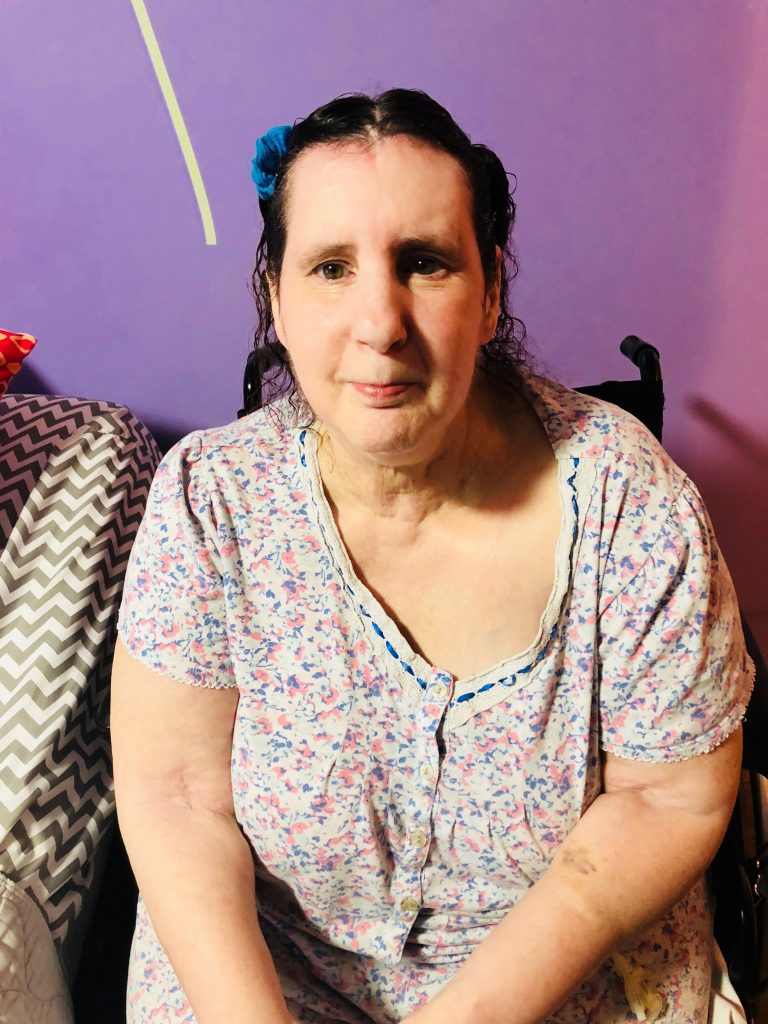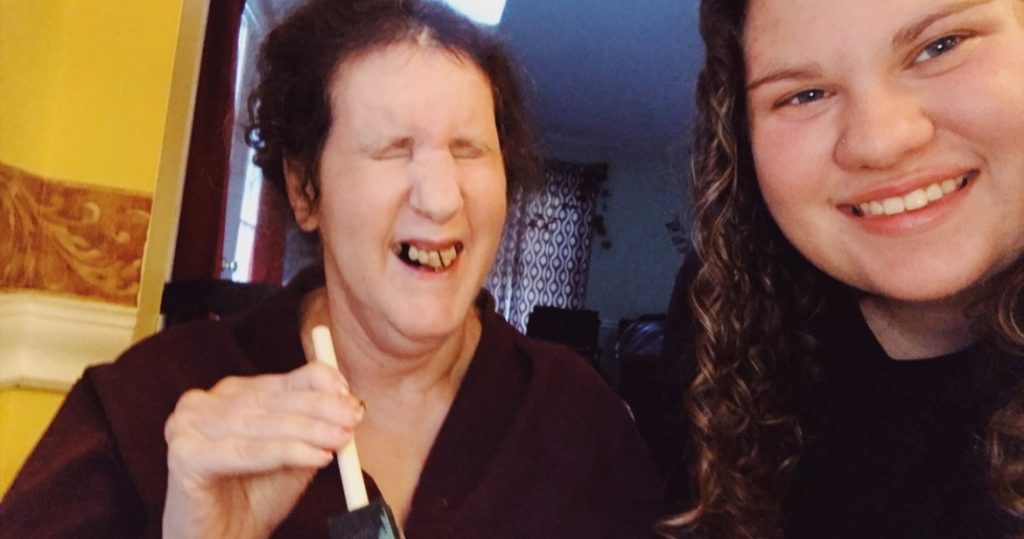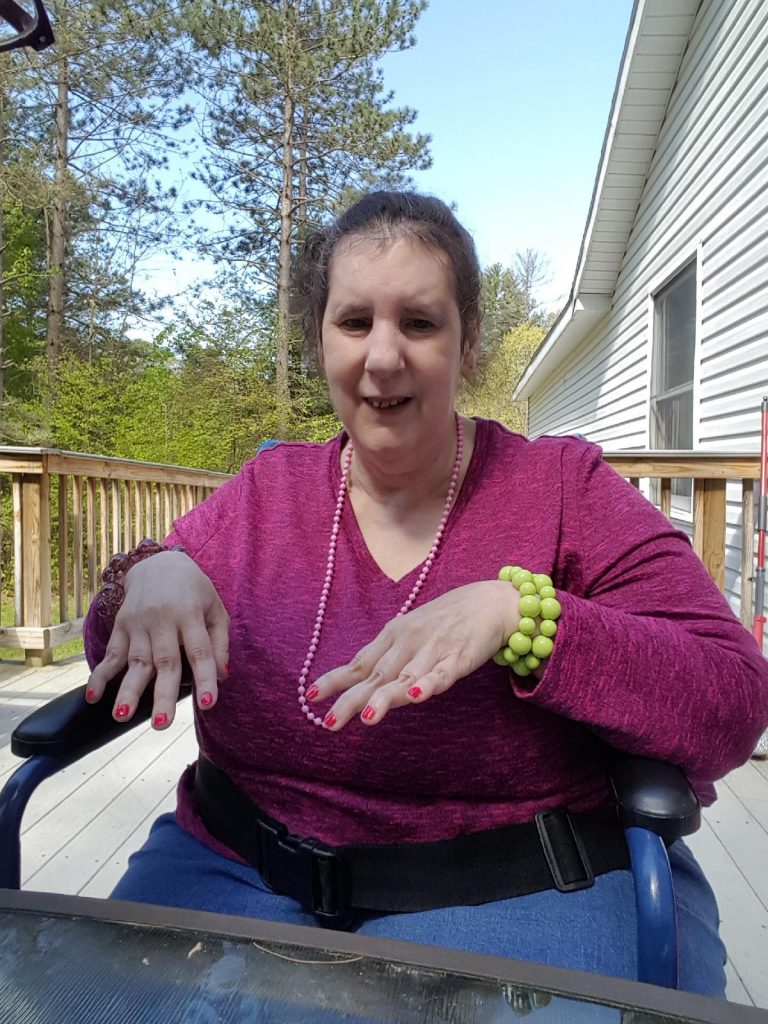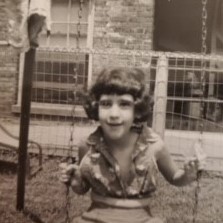In recognition of Direct Support Professionals (DSP) Week, we are honored to share this incredible story with you—one that illustrates the power of personal connection and demonstrates just how meaningful and lifechanging our work can be, not only for the individuals we support, but for their loved ones as well.
We invite you to read about the unforgettable bond that grew between Maura and Emily, a DSP at AIM, and the inevitable outcome of their constant presence in each other’s lives. It’s a poignant illustration of a lasting connection that stretches far beyond time and distance and extends into the lives of family and friends.
Emily and Maura: An Unbreakable Bond
New Beginnings

Maura arrived at the doorstep of her new home on Lindsey Road, a residential home owned by AIM Services, in 2016. After living many years of her life within a family care setting (living in a family’s home within the community), her new journey was about to begin. Over the next four years, Maura would live out the next chapter of her life with her friends and roommates and support staff at AIM. There, her experiences and opportunities were infused with personal choice, compassionate support, dignity, and respect.
Two months after Maura moved into her new home, Emily arrived at the same doorstep. Fresh out of high school and pondering her decision to join AIM as a Direct Support Professional (DSP), she stood there with the dream of a having a job that she could look forward to every day, that would bring her joy, and make a difference. What she did not yet know was that she was standing on the very doorstep that would lead her to realize her dream.
Creating Connection

Since very little was known of her past and her personal interests, Maura’s beginning days in her new home created a period of discovery for her and those there to support her. As Emily began supporting Maura more regularly, together they would sit and find ways to communicate with each other. Patiently sitting with Maura and massaging her hands as she loved, Emily began to uncover Maura’s interests. Gradually, Emily and the other staff filled Maura’s life with all that she loved and enjoyed. As days passed and Emily continually showed up for Maura, she began recognizing that Emily was someone with whom she could have a trusted and meaningful relationship, and a strong connection developed.
When Maura’s journey with AIM first began, it was conveyed that her level of verbal communication was limited to repeating words spoken to her. However, as Emily’s relationship with her grew, she realized she was capable of so much more. For example, at Christmas, as they sang songs together, Maura would continue singing after the song ended. While showing Maura books, she could point to different pictures of objects, colors, or animals and vocalize their names.
It was these meaningful opportunities for connection given to Maura at AIM that uncovered the depth of her capabilities, and it is the presence of these kinds of relationships, not just the information written on a piece of paper, that are the true indicators of a person reaching their power of potential.
The Power of Personal Choice

Through the support of Emily and the other amazing staff at her home, Maura experienced a life filled with personal choice. At home she enjoyed Disney Movies and getting her nails painted. She loved getting her hair done at salons and found it hilarious to look at herself in the large salon mirrors. Her favorite things included bracelets, nail polish, puzzles, blowing bubbles, Elvis, and books. She was also able to make it to a Giants game and the Lion King Musical.
Maura was part of a day program through an organization outside of AIM Services. Her days began early, which she did not enjoy. She would frequently take the blankets from her bed and pull them over her head and pretend to sleep. Often choosing to “play hooky” from her day program, she and Emily would spend days together, loving every moment of it. Each day, she was greeted by caring support staff whose only concern was helping her fulfill her own dreams and desires. This role was easy to many, as Maura’s personality brought joy and laughter to those around her.
“Buh Bye, Love You.”
In January 2020, Maura passed on at the age of 67 after a brief illness. Her absence is still felt strongly by her roommates, friends, support staff and family. In sharing the stories that have unfolded since her passing, the pain is still heavy on Emily as she misses her friend. Emily says she is grateful she spent time with Maura the day before her passing, remembering fondly a “Buh Bye, Love You”, and a kiss on the hand from her before she left.
Searching for Answers
Not long after that day, Emily received a call at Maura’s home. It was Maura’s sister, Beverly. Emily learned that Beverly and her siblings had been searching for their sister Maura for years. Beverly shared that she would google her sister’s name to see if it would bring her any new information, and the most recent search brought her to a picture of her sister and her obituary. Devastated, she found a way to connect to the home where Maura lived and found herself on the phone with Emily. The phone call lasted hours, with each woman finding answers to the mysteries surrounding Maura’s life. Emily would learn of Maura’s past; one infused with love and pain. Beverly would finally have the answer to her decades long question: “Is Maura happy?”
As Beverly and Emily began sharing stories with each other about Maura’s different stages of life, many pieces of her personal and family history were discovered…
Maura’s Early Life

Maura was born in 1952 in Illinois, the eldest of what would be five children. Her sister, Beverly, was born two years later, and as they grew, Beverly became very attached to Maura. Always by Maura’s side, she loved and cared for her like her own child. Their parents always sought whatever limited services, support, and community-focused opportunities that were available for Maura at that time, but their lives were not without continued challenges.
At the age of 3, Maura’s brother Robert (who was next in line under Beverly) sustained a traumatic brain injury which required constant care under difficult circumstances. At that time, their father traveled frequently for work, leaving their mother to care for all five children for weeks at a time. Beverly says she remembers how strong her mother remained, even while facing the obstacles of caring for two disabled children and the others while her dad was away for work.
“My mom was the strongest person I have ever met,” shares Beverly. “She inspires me through all of my own trials in life. She had incredible inner strength.”
As the years passed, providing for all the support needs for their children became increasingly overwhelming to Maura’s parents. In 1963, the family made the heartrending decision to move Maura to a residential school in Illinois. For Maura’s sister Beverly, this change was very difficult for her to accept. She felt like she had “lost her baby” when Maura left their family home. For many years, they remained close to Maura and visited her regularly. They watched Maura blossom as she learned to read, write her name, and discover even more of her abilities.
Change and Tragedy
Over the years, as the family arranged for various care for Maura, her father began discovering the limitations of residential support options for people with disabilities. It inspired him to leave his career and begin an organization that secured grants and increased support options for people with disabilities and their families. He actively fought to positively affect legislation to protect people with disabilities, and he successfully opened two of the first residential homes in Illinois and California.
When Maura was near the age of 21, her father’s work took him to New York. At that time, Maura moved to a developmental center in Suffolk County New York to be close to the family. Her sister Beverly remembers being able to see her more often during this time, as the center was located closer to their home.
A few years after moving to New York, tragedy once again affected Maura’s family. Maura’s youngest brother, Michael, was diagnosed with Leukemia. He survived for several years, with his dedicated mother never leaving his side at the hospital. He ultimately passed on at the age of 13.
Their mother’s vigilance to Michael during his illness, and the subsequent heartbreaking grief that enveloped her following Michael’s passing, ended her regular visits to see her daughter Maura. Beverly and the other family members continued to visit Maura, but it was evident that Maura missed her mother. Beverly recalls a change in her sister at that time, saying she was “never the same” once she stopped seeing her mother. Beverly says that it was as though “something in Maura died when she no longer saw her mother.”
Holding Out Hope
Beverly remained connected to her sister until the mid-80s, when she moved to Illinois. Then, in the 90s, their mother and father, whose health was failing, moved to California.
In 1992, Maura moved into a family care setting in New York, where she lived with a family in their own home. During this time, Beverly continued to write her sister and reach out to the family with whom she resided. As time went on, it seemed to her that Maura no longer recognized her, and communication was rarely returned.
Maura’s father, despite his poor health, also continued to try to find out if Maura was taken care of and happy, but there was no returned communication. The years passed by, and communication was lost entirely. The family felt the pain and the loss of connection deeply, and they held onto the hope that Maura was happy.
Beverly says that it was their father’s wish to “make a difference” in the world through his work for the disabled and because of Maura, he saw and believed that everyone had abilities, talents, and unique personalities. He raised his family with these beliefs and did his best to pass these characteristics to on to his children, as well as exemplify them through his work.
Offering Closure
Beverly says she felt closure for the first time in decades on that fateful day when Emily answered her call. She’s grateful that her sister was taken care of, something she had hoped for all her life. She’s comforted knowing that Emily’s care for Maura resembled the care she once offered her sister, and that their special connection is what returned happiness to Maura’s life.
Emily’s stories of Maura loving jewelry and nail polish are reminiscent of what Beverly remembers, and she’s happy to hear that Maura still enjoyed the “girly” things in life.
Emily and Beverly remain connected. Emily often receives texts from Beverly, and they are connected on social media. Beverly says she is forever grateful for Emily’s willingness to go above and beyond to bring her family closure.
In 2021, at Beverly’s suggestion, Emily even connected with Maura’s brother Richard upon a trip California to visit friends. They met in a Café in San Diego, where Richard and his wife brought pictures of Maura as a child. Emily’s compassion and willingness to meet with Maura’s family helped to lessen the pain they’d felt for years, knowing that she had love and care in her life.
Grateful for AIM
Beverly says she is thankful that AIM and Emily embody all the qualities that she would have wanted instilled into Maura’s life.
“AIM is the culmination of everything that my dad worked for, to create for families,” shared Beverly. “AIM and the support found there brought Maura back outside of herself.”
AIM’s guiding philosophy of support removes the barriers and limitations to people discovering their true potential. AIM’s flexible and customized support model is responsive to the uniqueness of each person and helps people of all ages and abilities on their own paths to choose personalized services that provide the greatest opportunities for independence. Along this path, it is the support staff that are the constant cheerleaders by the sides of the remarkable people they serve.
For Maura’s family, the support they received, even after her passing, helped soften their grief and provided a feeling of comfort they had sought for years. AIM’s commitment to person-centered support allows lives to be forever changed for the better.
Beverly said, “AIM is a place from heaven; everyone took such great care of Maura, and I am so encouraged to know that she was happy for the last years of her life. I know my Dad is smiling down and seeing his dreams come true for the world and Maura.”
Written by Lauren St. Pierre, Program Director of Development & Grant Writing, with permission from Maura’s family.
